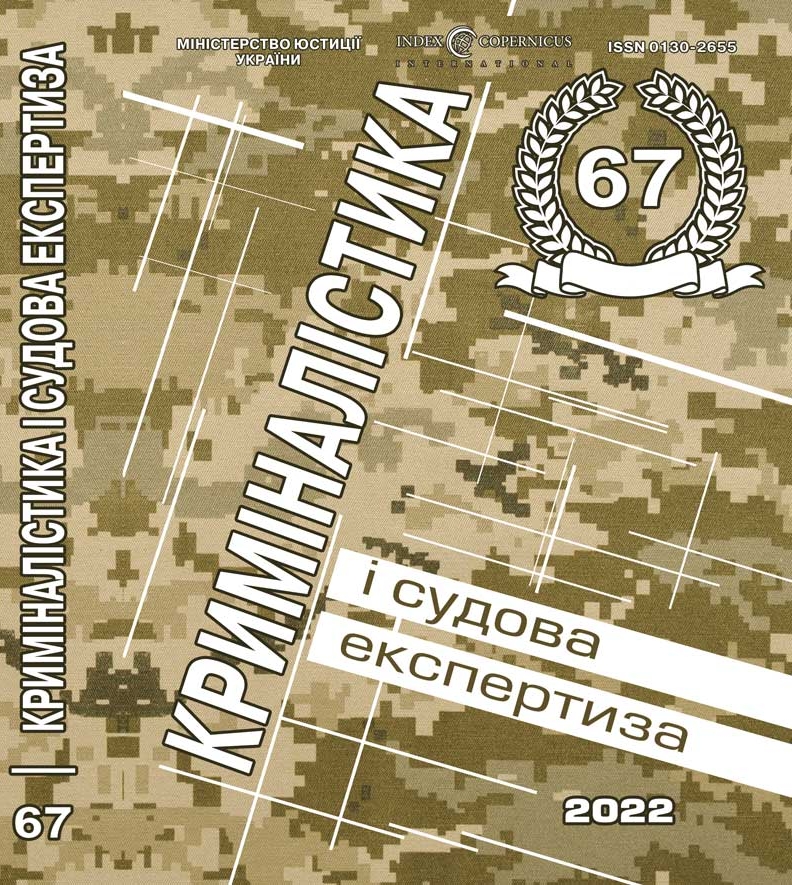DOI: https://doi.org/10.33994/kndise.2022.67.27
S. Bukhonskyi
The article is devoted to the analysis of the historical, legal, and theoretical foundations for changing the normative model for the beginning of a pre-trial investigation under the current Criminal Procedure Code of Ukraine, as well as determining the main directions for further improvement of the criminal procedural legislation, etc. As a result of the study, several provisions and conclusions have been formed regarding the deepening of the theories of criminal procedure and forensic science, substantiation of proposals for improving the current criminal procedural legislation, and the development of modern methodology (techniques) for investigating crimes.
It is noted that the current stage of criminal law enforcement requires the maximum approximation of the system of domestic criminal legislation to European standards. In this aspect, the formation of an effective system of pre-trial investigation is impossible without a comprehensive analysis and generalization of the state of crime in the country and abroad, means of combating it, and the processes of further reforming the criminal procedural legislation and the criminal justice system as a whole.
It is emphasized that this problem was traditionally considered by domestic scientists in the plane of the Criminal Procedure Code of Ukraine in 1960. However, relying on the legislation of the past, they cannot fully satisfy the modern requirements and challenges of investigative practice. First of all, it concerns the determination of the beginning of criminal proceedings – the emergence of a criminal procedural legal relationship.
The consideration of several drafts of the Code of Criminal Procedure of Ukraine of different editions on these issues is illustrated.
Thus, during this study, we came to the following conclusions. An analysis of the criminal procedural legislation does not allow us to unequivocally deny the possibility of carrying out verification actions before entering information into the ERDR. However, the question arises as to how complete information about the act is necessary to obtain for the proper implementation of its preliminary legal qualification, clarification of other information listed in part 5 of article 214 of the Code of Criminal Procedure of Ukraine, as well as the fulfillment of the requirements of part 4 of article 26, article 477 of the Code of Criminal Procedure of Ukraine.
According to Part 2 of Art. 93 of the Criminal Procedure Code of Ukraine, one of the ways to collect evidence by the prosecution is to conduct investigative (search) actions. At the initial stage of the pre-trial investigation, before entering information into the Unified Register of Pre-trial Investigations, in urgent cases, only an inspection of the scene of the incident can be carried out from the entire system of investigative (detective) actions provided for in the Code of Criminal Procedure of Ukraine.
However, the criminal procedural regulation of the inspection of the scene in part 3
of Art. 214 Code of Criminal Procedure of Ukraine is imperfect. Among the shortcomings, one should first highlight the gaps in determining the legal grounds for conducting an inspection of the scene of an incident in a person’s housing or other possessions, the imperfection of the legal regulation of further work with temporarily seized property, determining the types of inspections that can be carried out, etc.
These and other problems of legal regulation are detrimental to the effectiveness of
the work of investigative and operational groups when visiting the scene. Meanwhile,
a well-conducted inspection of the scene, the collection, and proper consolidation of
evidence during the investigative action is the key to the effectiveness of the work at
the initial stage of the pre-trial investigation and can ensure the achievement of the
objectives of criminal proceedings (Article 2 of the Code of Criminal Procedure).
Therefore, the shortcomings of the legal regulation of the inspection of the scene of
the incident also determine the relevance of the chosen research topic and the need,
based on the improvement of the current criminal procedural legislation.
Summarizing certain shortcomings of the procedural and legal regulation of the beginning of a pre-trial investigation, we also note that the Code of Criminal Procedure of Ukraine in 2012 did not eliminate the problem of unjustified refusals to start a pre-trial investigation, but significantly improved the situation in the field of observance of the applicants’ rights to access to justice.
Key words: criminal proceedings, beginning of a pre-trial investigation, departmental control, prosecutor’s supervision, judicial control

